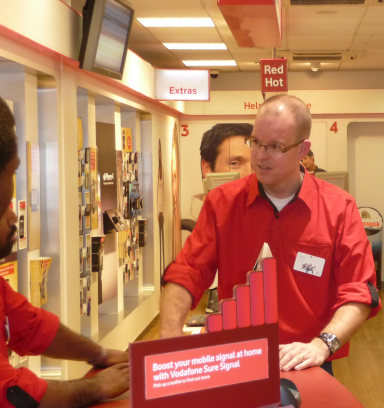As an industry analyst I spend a lot of my time providing commentary on the mobile market. Our research positions are drawn from a wide range of sources and detailed analysis of the latest developments. At CCS Insight we also pride ourselves on our close relationships with people in every part of the industry. Our customers appreciate our ability to provide clear advice based on real-life examples. However, I’ve felt that we’ve been missing one element that’s critical to really understanding the average consumer’s attitudes to mobile technology. The only way I was going to fill that gap was by rolling up my sleeves and going to work in a retail store to get a taste of what it is like at the “coal-face”, serving real customers.
I asked several of my contacts in the industry if it would be possible to work in one of their high-street stores, though I was sceptical whether anyone would take the risk of letting me loose on their customers. I’d almost given up hope when I got a call from Vodafone, which after much deliberation had agreed to let me have a full day working in a London store.
After a preliminary meeting and some basic training I arrived to start a 10 am to 7 pm shift at Vodafone’s King’s Road shop. My uniform and name badge were waiting for me, and the team, led by manager Ruhul, made me feel very welcome. I immediately got to work and barely stopped for the next nine hours.

My biggest impression is that it’s not just about selling phones and air time. The amount of customer support the team in store provides is remarkable — it really is a physical extension of the network’s customer services organisation. Enquires ranged from simple questions about how a phone works through to more complex technical challenges, such as getting a laptop to work with a USB dongle. Of course you also get lots of questions about bills and tariffs and, in the case of the King’s Road store, a lot of enquiries about the cost of roaming abroad. For me, this underlined how tricky customers find this, particularly when travelling outside Europe.
A further revelation was insurance. I’ve always been massively sceptical about insurance schemes — particularly for electrical goods such as washing machines and TVs. Like many consumers I’ve considered it to be a commission-fuelled rip-off for products that rarely go wrong. However I’ve certainly changed my mind on mobile phones, particularly high-end smartphones. The iPhone in particular has several risks associated with it, most notably its attractiveness to thieves and the propensity for the glass screen to shatter if it’s dropped.
Within an hour of the shop opening we had a customer arrive with a shattered iPhone screen. Fortunately he was insured, as was another customer later in the day whose HTC Desire HD had been stolen. But the flipside of the coin was a young lady who came into the store to tell us that she’d purchased an iPhone 4 two weeks ago, had gone out at the weekend and lost it. She was not insured. This means that she faces 24 months of paying £40 a month and will have to buy a SIM-free iPhone, at over £500. There was no easy answer to her predicament, although she got the best possible service from the team in the store given the circumstances.
These are just two of the areas where I gained additional insights and there were many more. That said, I accept that working for one day in a store in an affluent area of London hardly qualifies me as a retail expert, but the experience was invaluable.
At the end of my day in store, Ruhul and I shot a short video (below). I’m hopeful I can build on my experiences of mobile retailing and spend some time in other stores in the coming months. I’d love to hear from any networks or retailers out there that would be happy to offer me or other members of the CCS Insight team similar opportunities.

 Twitter
Twitter
 Facebook
Facebook
 LinkedIn
LinkedIn
 Email
Email